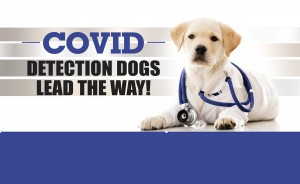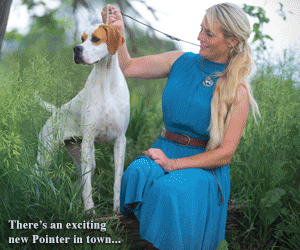COVID Detection Dogs Lead The Way!
Click here to read the complete article
 By Amy Fernandez
By Amy Fernandez
So, here we are. Nine months into pandemic life and we are still groping in the dark for answers. Even scarier, we seem to be getting used to it. Now, on the other hand, dogs are true existentialists. They just ain’t dealing with that nonsense.
Medical detection dogs are nothing new. In recent decades they have proven their worth diagnosing cancer, malaria and impending seizures, among other things. A few months back, I wrote about an experimental detection dog training project going on in Britain. Based on initial results, it seemed plausible that dogs could be trained to effortlessly, immediately identify COVID-19. Well, they can. It works and airports in Helsinski, Finland put the first K9 detection crews on the job recently.
This cutting-edge coronavirus screening protocol takes ten seconds flat–start to finish. If that sounds delusional, keep reading. It does not rely on nasal swabs, saliva samples, temperature checks or any of the other current, unreliable collection techniques. Each test subject receives a sterile, sanitized wipe to collect a fair sample of their body sweat. (I trust you get that without any graphics.) The subject then places the sample in a single use container–therefore eliminating any chance of cross-contamination. It is immediately presented to the K9 concealed right there behind a screen. If the dog alerts, the passenger is informed and blah, blah blah. The takeaway message is that dogs are proving to be cheaper, faster and far more reliable.
So, on to the other big question you are wondering about, zoonotic transmission. We are about nine months into this and, so far, there have been cases of dogs cohabitating with infected owners testing positive for COVID-19. However, no dogs have developed symptoms. As we know, it requires gazillions of mutations for a virus to discover a fail/safe formula capable of effortlessly jumping the species barrier. Cats are more susceptible to this strain of the virus and that’s a no biological surprise considering their susceptibility to several other coronaviruses.
From the get-go, the big worry about screening procedures, regardless of their reliability, has been the well-documented problem of asymptomatic carriers. And…I consider this the most amazing aspect of the deal, so far these COVID-19 K9s seem able to detect infection earlier than PCR diagnostic capabilities. That, as we know, currently reigns as the most trustworthy identification tool. Detection dogs, with a 94 percent success rate, have it beat by a mile.
Click here to read the complete article

Short URL: https://caninechronicle.com/?p=192980
Comments are closed











